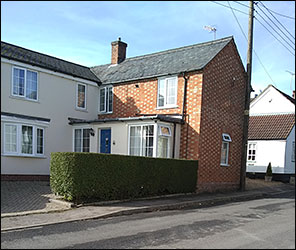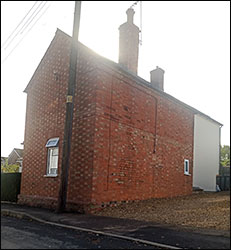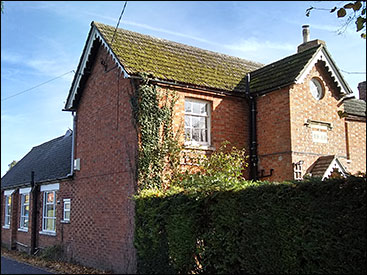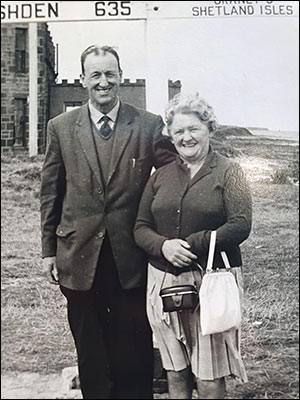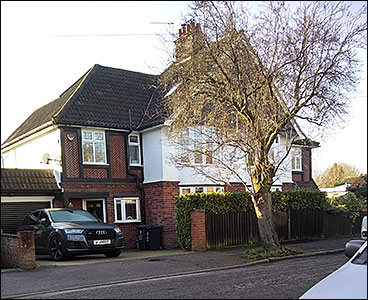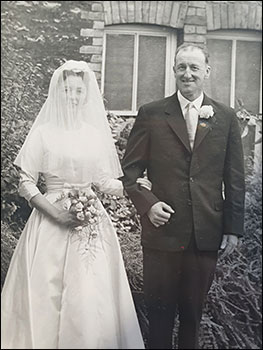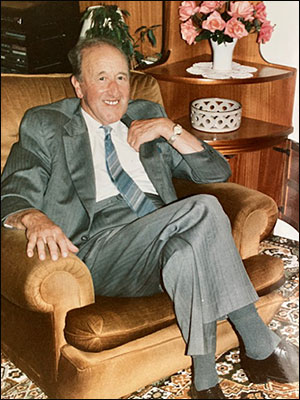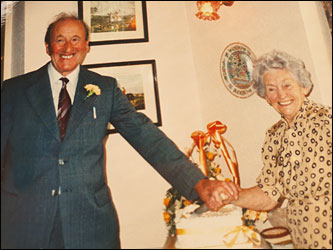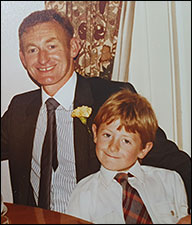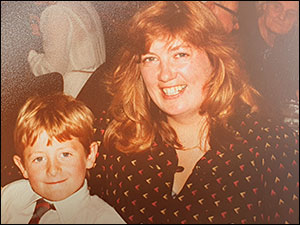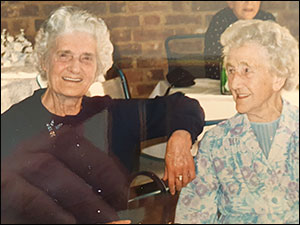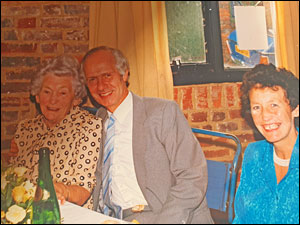|
|||||||||||||
| Courtesy of Peter Wildman, kindly typed by Greville Watson, 2022 |
|||||||||||||
|
Life Worth Living
By Cecil Roland Wildman
|
|||||||||||||
|
of Gold Street, Riseley and Rushden
|
|||||||||||||
|
|||||||||||||
|
I was born on the 21st Dec 1906 in the village of Riseley in Bedfordshire. I was the second child of my parents, the first, a daughter, was sickly from birth and only lived for 6 months. When I was born a healthy boy there was naturally relief and rejoicing in the family.
My parents both came from peasant stock – my maternal grandfather was a shepherd on a local farm and I only have vague memories of him as he died when I was only 5 years old. My paternal grandparents did at one time have a small holding in the village but as they had a family of 13 children there was never much money to spare. My father was the seventh child and as five died in infancy and 2 sons were killed in the First World War I only knew the surviving 4 daughters and 1 son in addition to my father very intimately. We lived in a small bricked cottage in Gold Street [number 11] consisting of 2 bedrooms and 2 downstairs rooms with a kitchen and various outbuildings culminating in the toilet at the top of the yard some 25 yards from the house. We had a small vegetable garden bounded on one side by our neighbour, Mrs Savage’s hen run, and as a small child I spent many hours watching the hens and knowing them all by sight. It was a standing joke in the village that it was dangerous to go up Gold Street at night as a Wildman and Savage lived next door to each other! It was the normal custom in those days when the children were old enough to leave school that the girls went into service at Bedford or one of the neighbouring towns and the boys went on the farm. My mother duly went into service at Bedford and at the time of her marriage was cook at one of the large houses in Shakespeare Road. My father, however, did not want farm work and instead went to Rushden and got a job in the prevailing shoe trade in the town. He did quite well and at the time of my birth was foreman of the Rough Stuff (press room) at Messrs Sanders & Sanders, one of the leading factories in the town. In those days there was no public transport and the only way he had of getting from Riseley to Rushden each day, a distance of 9 miles each way, was by bicycle. He did this night and morning for some 15 years – a feat of great endurance, and this may have been part of the cause of his early death at the age of 64. I can recall that as a small boy I used to go to the end of the street and meet him as he came from work and have the pleasure of riding and steering his bicycle up the road to our house.
One of my earliest recollections was that of the celebrations in the village for the coronation of King George Vth. This included a sports programme in one of the fields and one of the events was a race for very small children and which I took part. We all lined up and were given the signal to start. I remember being left behind as I had not realised the meaning of the signal, but after a shout from my father, ran after the others and eventually finished 1st and was rewarded with the prize of one shilling. When I was old enough to go to school my mother secured the post of cook at the big house – Mallory – at the end of the village. I went to my father’s parents to dinner and tea and was duly collected in the evening by my father or mother. I visited Mallory on several occasions with my mother and the large house with many rooms furnished in Edwardian style opened up a new world for me. I made friends with another small boy called Tommy Jeakins who lived in a small terraced house at the top of Gold Street in Rotten Row. However, when he was still a schoolboy he went to America where his sister was living and I have not seen him since. I often wonder if he has ever visited this country as I would like to see him again after some 60 years. My parents became very friendly with the landlords of the White Horse Inn at the top of the village – Mr & Mrs Beeby. Mr Beeby used to go in his horse and trap each Saturday morning to the neighbouring villages of Bourne End and Sharnbrook and deliver drinks to various houses. When I became old enough I used to accompany him on these journeys and had the pleasure of holding the reins of the horse as he made his various deliveries. At the end of the journey when we arrived back home I was rewarded with sixpence. In those days before wireless one had to make one’s own amusement in the home. My father loved to play cards and taught me how to play whist and cribbage at a very early age. My mother used to make pillow lace which entailed the use of many bobbins, all of which I got to know by sight. In the summer of 1914 the menace of the coming war with Germany seemed far away from the peaceful life in the village. However my father’s uncle Joe, who lived in London and came on a visit during the Bank Holiday in August, was very concerned when the war did break out that week and we were to receive an even grimmer reminder when my father’s brother George was killed in action in the first weeks of fighting in France. During the early part of the war a Welsh regiment stayed in the village overnight on its way to France. The soldiers were billeted in private houses and we agreed to have two for the night. During the evening my father suggested that we played cribbage and I can remember their astonishment that I was able to take part in the game at so young an age. During one’s lifetime there are certain dramatic moments and days that can change one’s future. The first of these occurred for me when my father asked me one evening if I would like to live in Rushden. It appeared that he had the opportunity of renting a new terraced house that was being erected in Carnegie Street. He had by this time grown somewhat weary of the journey by cycle each day to Rushden and back and had been trying to find a house nearer his work. I was very keen to go and after thinking the matter over we decided to move. So on the 18th Nov 1915 we put all our effects into a lorry and left Riseley and made our way to Rushden to begin a new life for me. 17 Carnegie Street, Rushden
When we arrived at our new house we found that it was barely finished, for the workmen were still there, and the walls were wet with distemper. However my father had sent one of the girls in his room – Maggie Pinnock – to be there on our arrival and have a good fire burning so it was reasonably comfortable. We found, however, that when we had put all our furniture in the house, that although it filled the house in Riseley, it looked very inadequate for this larger one. I now faced the rather daunting prospect of going to a new school. My father had arranged for the young son of one of his workmen – Charlie Hancock – to collect me next morning and take me to school. He duly arrived and took me to the Hayway School. However during the lunch break the master came to me and told me that I was at the wrong school and should have gone to Alfred Street. I felt that I could not face two new schools in one day so I went home and my father duly arranged for someone else to collect me next morning. This turned out to be Ada Prigmore and she took me to Alfred Street School. I was put in the same form – Standard 3 – that I had been in at Riseley and the form mistress was Miss Gadsby, a formidable female who ruled the class with an iron hand. However I found that, somewhat to my surprise, I had already done the work, particularly the maths, before at Riseley so I was able to settle down. My parents had bought me a new wooden scooter the previous Xmas so in the daylight hours I spent much of my time exploring the streets of Rushden on it and gradually getting to know my way around. As it was wartime there was no street lighting and it was very dark so we did not venture out much at night. As there was no Moravian Chapel in Rushden my parents looked round for an alternative to send me to Sunday School. My father had a relative in Rushden, John Wildman, and he had two children, Jack and Ada, who attended the Mission Church. So it was arranged that these two would collect me and take me to the Mission Sunday School. However I did not like it very much here and never settled down. I eventually became friendly with a boy who lived in the next street – Ralph Leeding – who used to go to the Independent Wesleyan Chapel. He suggested that I tried his Sunday School as I was not very happy at the Mission, so on one Sunday I went with him and found that the atmosphere was much more congenial. So started an association with this Church that has lasted all my life. Some of the factories, owing to the shortage of labour in wartime, were in the habit of employing schoolboys for an hour or two each evening after school hours. As a consequence I used to go to my father’s factory – Sanders & Sanders – to help in his press room with another boy – Don Dudley. We made ourselves generally useful and I quite enjoyed working there and earning a little pocket money. However the Government issued the decree that no factory in future could employ schoolboys so that this activity came to a stop. In the meantime I had settled down at Alfred Street School and moved into the more congenial atmosphere of form 4B under Mr Morris and then into the fifth form under Mr Huke. Generally I found the boys fairly friendly but I had one fracas early on with a boy called Bert Pearson. However it all ended happily and he became my best friend, and in the event was Best Man at my wedding. It was at about the age of 10 or 11 that I became interested in the opposite sex, in particular two girls named Dorothy and Winnie. Mr Huke had a system wherein all the pupils were given an arithmetic paper each week and those with the highest marks sat on the back row so that the least bright ones occupied the front rows. As I was normally in the first three, as were Dorothy and Winnie, we generally sat fairly near each other and became friendly. Mr Huke’s form was the one where the brighter children at the age of 11 were prepared for the Scholarship examination for entrance to the Wellingborough Grammar and High Schools. So on one Saturday morning about six of us sat for this examination at the old Technical College in Church Street, Wellingborough. I felt that I had done reasonably well and we all waited for the result. In due course a letter arrived from the examiners but on opening same I was very disappointed to read that I had failed. On arriving at school I found that the same fate had befallen all the others, even Dorothy, who was expected to pass. After the August holiday we all moved up to the sixth form under Miss Groome. Then out of the blue came the second of those dramatic days and moments that alter one’s life. One morning another letter arrived from the County Council informing me that I had gained a free place into Kettering Grammar School, as a result of the Scholarship examination. When I arrived at school I found that the only other person who had obtained a free place was Winnie, but in her case it was for Wellingborough High School. I remember that poor Dorothy was shattered by this news and became very jealous and unfriendly and passed out of my life. On the 21st Sept. 1918 I started attending Kettering Grammar School. In those days there was no regular bus service so we all went by train, changing at Wellingborough. I was put in form 2A as were nearly all the new boys and soon began to settle down. There were about 8 of us travelling in the train each day and one of whom, H.E.Bates, became world famous in later years, as an author. The school was divided into 4 houses, A.B.C.& D. and I found myself in House C. A weekly list was put up in the classroom each week giving the marks of each boy in order of merit. I did fairly well and usually found myself in the first five. I also played a lot of soccer and was very pleased when I was selected to represent House C in the matches against the other houses. Our half term in that year of 1918 fell on Nov 11th – a momentous day. When the announcement of the end of the war was made, everybody seemed to flock to the streets and I can recall marching up and down the High Street with crowds of people singing and relieved that the war was at last over. I continued to do fairly well at school and progressed via 3A and 4A into the 5th form. In the summer terms I played a lot of cricket and began to be very interested in the game at county level and this love of the game has become stronger during my life. In 1920 I went with my friend Bert Pearson to stay with his married sister at Northampton for 3 days so that we could go to see Northants play Surrey. This was a great treat for us particularly as our great idol Jack Hobbs was playing. Unfortunately he only made 3 runs in the first innings although he did score 50 in the second. This was a great match and contained 2 records that are still unbeaten. These were (1) the fastest ever 100 scored by P.G.H.Fender in 35 minutes, and (2) the highest number of runs made in a county match. Northants, although beaten in the end, played much above their average form. These 3 days must have made a great impression upon me as I can still remember quite distinctly the show we saw one evening at the New Theatre and the film we saw the next night at the Exchange Cinema. When I was in the Vth Form and the summer term came along I was very anxious to get in the 1st Eleven at cricket. When I was practising batting in the school yard before the season started I noticed that the 1st Eleven Captain was watching me closely. When the team for the first match duly came up on the notice board I was delighted to see my name among it. I did reasonably well and played in all the matches that season, although as a team we were not very successful. Although I made many new friends at school I continued to be very friendly with Bert Pearson during the evenings and weekends. Winnie in the meantime had found a new friend – Gwen – at Wellingborough School and in course of time we all became friendly. However, unfortunately for all concerned, we boys had a hanger on, a friend of Bert’s called Henry Dunkley, which meant a ratio of 3 boys to 2 girls which eventually was unacceptable to the girls and our association came to an end. I remember that Bert was very sorry about this as he was very keen on Gwen. However he soon found solace in another girl, Dorrie, whom he eventually married. When the summer term of 1922 came to an end the question of whether or not I should leave school was discussed. I decided to see if I could get a job and answered an advertisement in the local paper from a firm of Leather Factors in Rushden – A.W.Durrad & Co – for a clerk/warehouseman. I had an interview but was rather disappointed that I was unsuccessful in getting the post so I carried on at school. It was generally agreed that I should remain at school for another year but just before Easter there occurred another of those dramatic moments that alter the course of one’s life. I unexpectedly heard from Messrs A.W.Durrad & Co that the boy that they had set on in August had proved unsatisfactory and had been given notice to leave and I was offered the post. So it was decided that I accept and consequently I left school at Easter and commenced work at A.W.Durrad & Co on the Wednesday of Easter week 1923 thus starting an association with the leather trade that has lasted all my life. A.W.Durrad were, and still are, well-known Leather Factors with a head office in Leicester. The Rushden branch was managed by a Mr Charles Webb, a former professional footballer and a member of a well-known family of saddlers who, at that time, had shops in both Rushden and Higham Ferrers. As Mr Webb spent most of his time away from the office calling on customers I spent a great deal of the time on my own in a position of some responsibility, as I had to deal with all phone calls, and any customers that paid us a visit, and also giving out the various orders of leather to the Carriers and looking after the stock. At first I had some difficulty in balancing all the stock feetages as we sold both upper and sole leathers. However I soon settled down and got familiar with most of the makes of leather which was a great help to me in later years. During the war years (1914-1918) most people stayed a home at holiday time so consequently it was the summer holiday of 1920 before I went away with my parents. We went to Wimbledon for a week and stayed with my mother’s cousin. We had a very interesting time seeing all the sights of London to which we were taken by our cousin and for whom we were very grateful. The next year, 1921, we were recommended by a friend of the family to go to a house in Brighton run by Mrs Bruce, and it was here that I had my first view of the sea. We enjoyed the holiday and went again the next 2 years. In 1924 we decided on a change of scene and went to Bournemouth to the home of Mrs White in St. Luke’s Road, the first of many visits to this resort. We had a very enjoyable holiday and went again the next 2 years. As I had left school at Easter I missed another season in the school cricket 1st Eleven. However I joined the Rushden Town Club who had a 3rd Eleven for young players. However the competition for places was very strong and I did not immediately get in the team. By a strange coincidence when the match against my old school at Kettering came, although I was not originally selected I eventually played, as one player dropped out. Although my old school mates were very keen to get me out I scored 26 runs which was, at that time, my highest score, and as a result was given a regular place in the Rushden 3rd Eleven. After I had been with A.W.Durrad & Co for 3 years, in the summer of 1926 Mr Webb informed me that he would be leaving the firm at August. I was agreeably surprised when Mr A.W.Durrad informed me that he had decided to promote me to be manager in place of Mr Webb. This meant that I should be calling on all our customers in Northamptonshire and also meant an increase in salary plus commission on sales. I was still quite young, only 19, but after some early problems with some of the customers, I soon became known to them and did some good business. We appointed a young school friend of mine, Reg Sanders, to take my place in the warehouse and we got on well together. My father had by this time moved to B.Denton & Son as foreman of the Rough Stuff Dept and was able to put some sole leather business my way which was a great help. In order to help me on the sole leather side of the business Mr Durrad took me with him on a tour of the tanneries in Lancashire. We had our base and hotel in Liverpool and visited many tanneries in the area. I found this very interesting and enjoyed the 3 day visit. My father was very keen to have a car of his own so in 1927 we bought a second-hand 2 seater bull nosed Morris (DP 7885) from the Wargate Motors at about £100. Mr Murray of Wargate took us for a ride round the villages and I took the wheel and drove for about an hour. This was all the driving instruction I received as in those days there was no driving test, and very little traffic on the roads. In due course I taught my father how to drive but he was not a very good driver and had one or two minor accidents. I now used the car for my business instead of the local buses and once a month, on Saturday mornings, I went to the head office at Leicester. On those days in the afternoons I started going to Filbert Street to see Leicester City. This started an association with this Club that has lasted all my life and I have been a season ticket holder for the past 20 years, and have made 3 visits to Wembley for their appearances in the Cup Final. On Dec 21st 1927 I reached the age of 21 and in consequence my parents arranged for a party which was held in the old YMCA Hall. We invited about 70 friends and relations and had a very enjoyable evening. My paternal grandfather was still alive at the age of 86 and was very glad that he was able to attend. By this time I had progressed through the Sunday School in the Independent Wesleyan Church to the Bible Class which was very strong with a regular attendance of about 20 young men. We had a very popular leader Mr George Hall and at festive times he invited us all to join his family at a party. He had 2 daughters and the eldest, Connie, was now a friend of Winnie and a teacher at Wollaston School. The 2 girls were both members of the “Y” Branch of the B.W.T.A. and this young organisation frequently organised a dance on Saturday evenings at the B.W.T.A. Hall. Most of us boys normally attended these functions and as a result I became friendly with Connie. On one or two occasions I had a date with her and occasionally gave her a lift in my car from Wollaston to Rushden. This affair dragged on for a year or so but I was not very happy with this association and was more interested in her friend Winnie. The problem was now to alter the situation without giving offence to the Hall family which I was reluctant to do. Very unexpectedly the position was dramatically changed by no less a person than Connie herself. One Saturday evening in October 1929, 3 of us boys were standing at the entrance to the B.W.T.A. Hall debating whether to go to the dance or not when up the steps came Connie with a boy friend! This turned out to be a Mr Guest who was a fellow teacher of hers at Wollaston School. By a strange coincidence he is now a regular attender at the Northants County Cricket Ground and I feel sorely tempted to shake him by the hand as he played so great a part in my life. This would no doubt astonish him as he probably now does not remember the incident and, in any case, his friendship with Connie did not last long. Looking back, that moment on the steps of the B.W.T.A. Hall was probably the most dramatic of my life as it had a greater influence on my future than did any other. The 2 boys with me decided not to go to the dance and were very surprised to learn that I was going. I realised that here was my great opportunity so I went to the dance and spent most of the evening dancing with Winnie. This was the beginning of our partnership culminating in our engagement and marriage in the future years. I was now doing quite well in my work as Sales Representative for A.W.Durrad & Co. After about a year as manager, on one of my Saturday morning visits to Leicester I was presented with a cheque for £80 in payment of my commission. This represented in those days a large sum of money and I opened a Bank a/c with it for future use. We had now acquired a new car, a Morris 12 (RP 7247), in place of the old two seater. In the early 1930s the shoe trade had a minor slump and as a result my father was out of work for a few months before getting a job at John Whites. I also found leather more difficult to sell and as a result of the prevailing conditions I was informed by Messrs A.W.Durrad in 1931 that they could no longer pay me a regular salary but instead would pay me commission on all goods sold. This idea did not appeal to me and as I was now familiar with both the leather suppliers and manufacturers decided to branch out on my own account. I still had the £80 in the Bank and it was with this amount, which now seems so ridiculously small, that I started trading as a Leather Factor. Although trade was still very slow I was able to pay my way as I was still unmarried with few overhead expenses, and delivered all of my orders in my car. So by the end of 1933 I had made a small profit each year and the £80 I started with was now £400. Then, in Jan 1934 came my first set back. One of my best customers, F.W.Page & Co of Wellingborough went into voluntary liquidation and owed me £300 so that I was almost back to where I started. Although this set back my wedding plans for a few months I was able to carry on my business as usual. I was now playing cricket regularly each Saturday for Rushden Baptist Club and as an opening batsman was fairly successful with a highest score of 64 not out. After a few seasons playing friendlies we joined the Kettering & District League and became one of the strongest teams in the 1st Division. By the beginning of the year 1935 I had recovered from my bad debt and my business was improving. As a result Winnie and I decided to get married later in the year and commenced looking round for a suitable house to live in. We finally decided on a new house that was being built in St. Mary’s Avenue – a new road leading off the Wellingborough Road. We had a few extras to the original plans and the purchase price was £625, so on Aug 1st 1935 we were married at the Independent Wesleyan Church by the Rev. C.J.Keeler. After the wedding reception in the Church Hall we went to Babbacombe for our honeymoon. We had a very enjoyable week of glorious weather and then returned to Rushden to start a new life together. 31 St. Mary’s Avenue, Rushden
As our house was not quite finished we lived with my parents for about a month. When we finally moved in we had a lot of work to do outside in the garden and preparing the ground for a garage. In this latter resect we had considerable help from a friend of my father, Mr E.Smith, in concreting the garage floor and helping assemble the portable wooden garage. However we soon settled in and our two friends, Den and Grace Knight who had just married, came and lived next door to us. I was now fairly well established as a Leather Factor and Winnie was able to carry on working until the advent of our first child. This happy event occurred in 1938 when our little girl was born. Our joy over this birth and the extra responsibility it gave us was only marred by the talk in the air of rumours of war between our country and Germany. Although our Government did all they could to avert this disaster it became apparent in the summer of 1939 that war was inevitable. The dreaded day occurred on Sept 3rd 1939 when the Prime Minister announced on the radio that our country was at war with Germany. The Government decided to evacuate the children from the large cities, for fear of air attacks, to the smaller towns. Rushden had an allocation and I volunteered to use my car taking the children round the town to their various new homes. At the end of the day all the children had been housed but a few of their teachers were still left and we took 2 of them in – 2 young ladies. One of them only stayed with us for a short time but the other – Jean – was with us for some months and settled down well with us. I was apprehensive about my own future as every able-bodied man was being conscripted to the forces and my own age group would eventually be called up. In the summer of 1940 I joined the Auxiliary Fire Service on a part-time basis and began to learn the rudiments of firefighting. The air raids, as forecast, had now begun in earnest and in October, Rushden itself was a target for a string of bombs that fell on the town doing considerable damage and killed 4 people. I was still wondering how long I should be able to carry on my business as my call up time was approaching when unexpectedly a notice appeared at the Rushden Fire Station asking for 7 men to join as full time firemen. As this seemed to be the answer to my problem I put my name down and on Dec 1st 1940 became a full time fireman. The hours we worked were 12 hours on duty and 12 hours off so that I was able to carry on my business on half of the day, either morning or afternoon, and at the same time keep in touch with my family at home. In September 1941 my father was taken ill and went into Northampton Hospital. Quite unexpectedly he died on Sept 30th 1941 after only about a week’s illness. My mother never really recovered from this shock and was never quite the same again. In the beginning of 1942 there came another of those dramatic moments in my life. I received a visit from Mr Don Bugby who was manager of a firm of Leather Factors situated in Rushden. It appears that this firm had not kept their promise to him to make him a Director so he had decided to leave. He came to ask me if I would consider a partnership with him and if so premises belonging to his father-in-law were available to us. After pointing out to him that owing to my fire service duties I was only able to work half time and which he accepted. I decided to take up this offer of partnership as I realised in my present circumstances it would be a good thing for me. So in May 1942 Wildman & Bugby Ltd came into being with a capital of £3000 – both of us contributing £1500 each – which I was just able to manage. We started off with a small staff, a warehouseman, and young girl clerk – Catherine Davis – with Winnie and Mrs Bugby looking after the ledgers. However trade was good in those war years and we commenced making a profit from the start and from those early days the business has grown in strength year by year and is now worth nearly £80,000. In 1943 we reached another landmark in our lives when our son was born. Our little girl was now 5 years old and we had the difficult task of bringing up a young family in wartime, especially with the increasing risk of air raids. Also I had now less time at home as our duty hours had been increased and we now had two days on duty and one day off. This meant that I had less time for my business and was glad that I now had a partner, who was unfit for any war service, to look after affairs. The war dragged for another two years but at last in May 1945 the war with Germany was over although the Japanese carried on for a few more months. We decided to take a chance and have our first holiday with our children and went to Bognor for a week in June, when fortunately the war ended. Petrol was rationed very severely but we managed to save enough to go by car. We had an enjoyable time and looked forward to regular holidays by the sea.
That summer (1946) we paid our first visit to the Beechcliffe Hotel Bournemouth and met two other families – the Garbutts with their son Ian and the Hynds with their daughter Pat. We all went back for the same times the next few years and became very friendly with the Hynds family as our daughters were the same age and this friendship still exists. We have made several visits to their home in Weston-Super-Mare and they in turn have stayed with us. In 1951 when he was eight years we entered our son (Peter’s) name at Wellingborough, Kimbolton and Bedford Schools. The Wellingborough entrance examination came first and as he passed this satisfactorily he duly started there in September. So the question of our children’s education was settled to our satisfaction. At about this time my mother suffered a serious stroke. She had had a minor one some years previously but this was more severe and deprived her of her speech as well as paralysis in her limbs. She had to leave her home and come and live with us until her death which occurred on Aug 30th 1953. In the spring of 1954 we began to look round for a better and bigger house and one belonging to Mr Ron Fox in Prospect Avenue came on to the market and having inspected it we decided to buy it. We soon sold our own house at a profit of £2000 and, after some structural alterations, moved in to our new house in May. 37 Prospect Avenue
Meantime our business of Wildman & Bugby was doing well and we now acquired a van complete with driver to deliver all our leather, and also a new salesman to cover the Leicester area. In 1956, however, my partner Mr Don Bugby, was forced to give up business owing to ill health. By that time the business was worth £25,000 so that the £1500 that we had each put in at the start was now worth £12,500 each. We mutually agreed together that I would buy his shareholdings over a period of 3 years. This I managed to do with some difficulty which meant that Winnie and I held all the shares amounting to £25,000. With death duties in view I was advised by the firm’s Solicitors to allocate some of my shares to my 2 children, so a proportion of my shares were duly allocated equally to them. We had now commenced business with an Indian firm in Calcutta and the time was ripe for someone to visit them with a view to doing regular business. So in May 1957 I made arrangements to fly out to see them. The first stop for refuelling was Rome – a place I was anxious to visit. Fortunately for me our plane was delayed for a whole day owing to engine trouble and we all were taken round Rome to see the various places of interest by coach. I eventually arrived at Calcutta a day late but I had enough time to arrange for a regular supply of leather to be sent to us. I was taken round Calcutta by car and found the conditions terribly bad, crowded with people lying, and sometimes living, on the pavements. The weather was very hot and I was glad to get back to my hotel with its air conditioned room. Our business with the tanners in Calcutta has grown and I now have made 4 visits in all and have some very good friends there who have always made me very welcome.
|
|||||||||||||
This event together with our own Silver Wedding made this year a memorable one for us. To celebrate our Silver Wedding, Winnie and I made our first visit overseas going to Venice, Florence and Rome which we greatly enjoyed. This was in August and then on Oct 1st Margaret was married at the Independent Wesleyan Church as we ourselves had been 25 years before. After looking around they had finally decided to live at Shepperton, which was fairly near London, where they both worked. Our son, Peter, had now left Wellingborough School and after a year at the Leather College in Northampton, joined Wildman & Bugby Ltd, thus ensuring continuity in the family business. |
|||||||||||||
|
|
|||||||||||||
Since 1948 I had held the office of Treasurer at the Independent Wesleyan Church. Our links with this church were further strengthened when our son, Peter, was married there at Easter 1975 following our own wedding there and our daughter’s. He had bought a nice house in Higham Ferrers and their first child, a son, was born in 1976. They have now a second son so that we are blessed with 4 grandchildren in all. After reaching the age of 76 I relinquished some of my duties in the business leaving Peter in charge together with a new Sales Director. I have also resigned from my office as Treasurer of the Church and so Winnie and I now look forward to a few more years of companionship together. |
|||||||||||||
|
|||||||||||||
| Notes from this website: Cecil Roland Wildman, aged 28 Leather Factor, (son of Arthur) of 17 Carnegie Street married Winifred Kate Bridgment, aged 27, Leather Factors Clerk, (daughter of Harry) of 113 Higham Road, Rushden at the Independent Wesleyan Church, on 01 Aug 1935. Winifred Kate Wildman died 21 Jun 1990 and is recorded on Memorial Wall 31 in Rushden Cemetery. Cecil Roland Wildman died 21 Aug 1996, aged 89, and is buried in Rushden Cemetery grave DA 56. Note: Private George Wildman: 7354 Bedfordshire Regiment "H" Coy. 1st Bn., Died 25 October 1914, Age 36 years old. Commemorated on Le Touret Memorial, Panel 10 and 11, France. |
|||||||||||||
|
|
|||||||||||||
|
|
|||||||||||||
|
|
|||||||||||||
|
|
|||||||||||||
